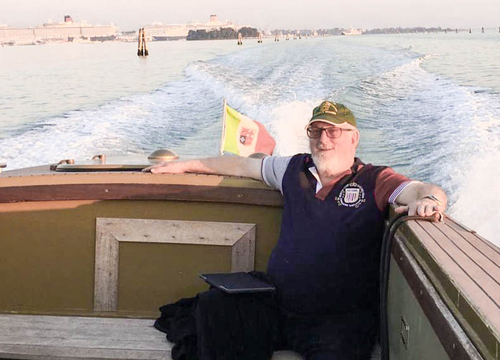Turning loss into light
With a planned gift in memory of his son and wife, Ted Alper will help generations of students in need to complete their degrees.
For Ted Alper, growing a scholarship at the university where his son found his calling is the perfect thing to do with proceeds from the future sale of the home that son would have inherited.
“It’s in honor of Josh, who was a great human being. He would want us to give this money,” he says.
Joshua Alper Marines (Stevenson ‘98, literature) found his place in the world when he came to UC Santa Cruz. He was an avid cyclist. He became deeply involved in the Santa Cruz independent music scene and performed in bands of various genres, including noise psychedelic/punk and college rock. He volunteered, especially for Food Not Bombs.
A few years after graduating, he found a job at the university library. He was popular with his fellow staff. He met librarian Annette Marines. They fell in love and were married.
“UC Santa Cruz was a very, very fortuitous match of person and situation,” his father says.
In 2013, Joshua was hit by a car and killed while riding his bike on Highway 1, and Ted Alper and his wife Marsha established a scholarship in Joshua’s name. When Marsha Alper died, it became the Alper Family Scholarship Program in honor of Joshua Marc Alper. It is awarded to students in financial need who, as Joshua did, volunteer in the community.
A house funds a scholarship

Ted Alper has put the scholarship in his will, which when it is realized will add proceeds from selling his Palo Alto home. Noting the value of the house has multiplied many times since he bought it, Alper says he hopes some of his neighbors will also realize that appreciated real estate and other property creates opportunities to help others.
“If more people thought, ‘My kids would be OK with $900,000 rather than a million,’ and designated a portion of their housing proceeds to go to a cause they care about—you know what? Their kids would be OK.”
Alper sees helping students in need to complete their education as one of the most effective ways he can support social mobility.
“I see scholarships as the biggest bang for the buck,” Alper says. “I hope people are inspired to give money to such a good cause, because they will feel good. You get more out of giving than receiving.”
“But for the grace of God”
Ted Alper’s concern about inequity began during his childhood. He grew up in Brooklyn, and his father had an electrical supply and manufacturing business in the Bowery neighborhood. The poverty he saw there helped shape his worldview. “There but for the grace of God go I,” his father would tell him.
His parents had minimal education, but the culture of his neighborhood near Brooklyn College was intensely academic. He and his siblings all earned graduate degrees. He has a psychology Ph.D. and is retired from a career of training school psychologists at California State University East Bay.
Alper has also established a scholarship at CSUEB for psychology students and is arranging another at the University of Oregon for elementary school counselors.
He spends hours each day in his backyard, listening to NPR and reading the Atlantic Monthly and the New York Times. He fills his conversation with jokes and laughs infectiously even as he reflects on the tragedies behind his gifts.
“I’ve had lots of luck, both good and bad,” he says.